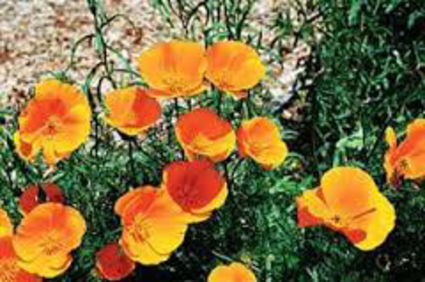Want wildflowers?
Water Matters

Fire clearance season comes early this year, and the sound of mowers and weed whackers echoes off the mountainsides. Just what are we whacking anyway, and what if it took almost no extra effort to increase the amount and variety of wildflowers on your land?
Since Spaniards brought cattle to the new world, California has undergone a wholesale change from native perennial flowering plants and grasses to non-native annual grasses that grow fast, die young, and fuel conflagrations of wildfire. Most of our open areas are mostly covered with cheatgrass (Bromus tectorum), foxtail barley (Hordeum murinum), and other non-native annual grasses. These invasive species have almost totally out competed the California native plants. Take cheatgrass for example. It sprouts in our first fall rains, and by spring, is already maturing and setting seed, as well as sucking up the soil moisture and nutrients. There is not much left for other plants.
We are lucky here in Tehachapi to still have such a variety of wildflowers hanging in there among the non-native annual grasses. In your little corner of the world, it's not difficult to tip the scales toward the wildflowers. Whack the non-native annual grasses before their seeds mature, and avoid damaging anything that is not a grass. That little cluster of broad leaves could very well mature into wildflower beauty. It is just a matter of paying attention and being a little more careful when you're out there with the string trimmer.
I've been doing this in my yard for going on three springs, and have been delighted with the changes. Every year, a handful of new flower species makes an appearance. It's a long slow process, the amount of cheatgrass never seems to decline. But I've got to do fire clearance regardless, and the wildflower goal makes it at least interesting. I was glad to see the fire clearance date moved up to June first, more grass will be whacked before the seeds are mature.
You can always help the process along by collecting seeds of the common wildflowers. Poppies are a great option, and are so fun to collect. Poppy seed pods explode when they're mature, tossing the seeds several feet away from the parent plant. When you collect the dried poppy seed pods, wrap your fist around the pod so it will explode inside your palm with a little buzz. The kids will love it! If the pods are not exploding, they're not mature yet - wait a few days. Then toss the seeds in the yard. They may grow, but if not, you've only invested ten minutes.
Let's wildflower Tehachapi!



